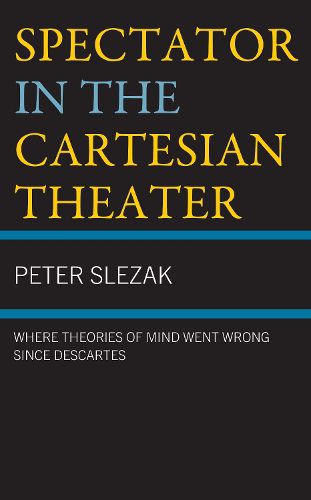Readings Newsletter
Become a Readings Member to make your shopping experience even easier.
Sign in or sign up for free!
You’re not far away from qualifying for FREE standard shipping within Australia
You’ve qualified for FREE standard shipping within Australia
The cart is loading…






Seemingly unrelated controversies about consciousness, language, and vision have a deep connection, a mistake that has not been noticed. Spectator in the Cartesian Theater: Where Theories of Mind Went Wrong since Descartes suggests that this error arises not from what is put into a theory but rather from what is missing. In Daniel Dennett's famous metaphor of a "Cartesian Theater," a homunculus or "little man" watches the screen on which our thoughts and sensations appear. Peter Slezak argues that we fail to notice that we are doing an essential part of the work of the theory and, therefore, we are the spectators in the Cartesian theory-like looking for our spectacles while wearing them. As philosopher Jerry Fodor pointed out, "The question is not what is obvious to the theorist; the question is what follows from the theory."
This book argues that a proper understanding of the mistake reveals a deep connection among a range of seemingly unrelated problems at the forefront of controversy about consciousness, language, and vision, among others. In his physiological writings neglected by philosophers, Descartes explained how the pseudo-explanation arises, as Chomsky warns, by depending on "an intelligent and comprehending reader," the central theme of the book.
$9.00 standard shipping within Australia
FREE standard shipping within Australia for orders over $100.00
Express & International shipping calculated at checkout
Seemingly unrelated controversies about consciousness, language, and vision have a deep connection, a mistake that has not been noticed. Spectator in the Cartesian Theater: Where Theories of Mind Went Wrong since Descartes suggests that this error arises not from what is put into a theory but rather from what is missing. In Daniel Dennett's famous metaphor of a "Cartesian Theater," a homunculus or "little man" watches the screen on which our thoughts and sensations appear. Peter Slezak argues that we fail to notice that we are doing an essential part of the work of the theory and, therefore, we are the spectators in the Cartesian theory-like looking for our spectacles while wearing them. As philosopher Jerry Fodor pointed out, "The question is not what is obvious to the theorist; the question is what follows from the theory."
This book argues that a proper understanding of the mistake reveals a deep connection among a range of seemingly unrelated problems at the forefront of controversy about consciousness, language, and vision, among others. In his physiological writings neglected by philosophers, Descartes explained how the pseudo-explanation arises, as Chomsky warns, by depending on "an intelligent and comprehending reader," the central theme of the book.